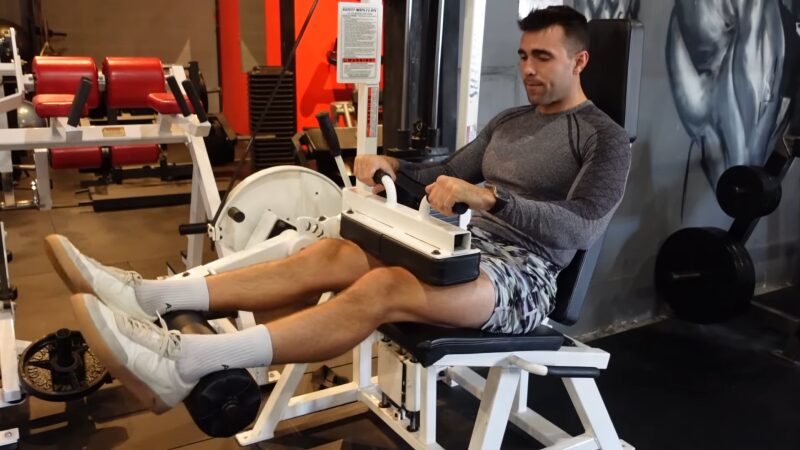Myo-Reps
are
an
advanced
training
method
that
involves
pushing
a
set
to
the
edge
of
failure
to
maximize
muscle
fiber
activation.
This
technique
keeps
the
fibers
engaged
over
a
longer
duration
by
using
brief
rest
intervals
and
performing
multiple
short
sets.
This
results
in
enhanced
muscle
hypertrophy
efficiency.
How
To
Perform

To
execute
Myo-Reps
effectively,
start
with
an
activation
set,
aiming
to
reach
failure
within
the
10-12
rep
range.
After
this
set,
rack
the
weight
and
take
4-5
deep
breaths,
ensuring
this
rest
period
does
not
exceed
15
seconds.
Next,
begin
the
first
Myo-Rep
set,
performing
6-8
reps
to
failure.
Rack
the
weight
once
more
and
repeat
the
short
rest
period
of
4-5
breaths.
Continue
with
another
set,
this
time
performing
4-6
reps
to
failure.
Keep
alternating
between
these
short
rest
periods
and
sets
until
maintaining
proper
form
for
even
a
single
rep
becomes
impossible.
Capped
Myo-Rep
Sets
Myo-Reps
can
be
structured
with
a
capped
number
of
total
repetitions
for
an
exercise.
This
approach
allows
one
to
regulate
intensity
and
volume
effectively.
To
illustrate,
a
set
capped
at
20
total
Myo-Reps
begins
with
an
activation
set
of
10-12
repetitions.
Following
the
activation
set,
the
additional
20
reps
are
performed
in
a
Myo-Rep
fashion,
divided
into
smaller
sets
with
minimal
rest.
Examples
include:
-
5+5+5+5
=
20
Total
Myo-Reps -
6+4+4+4+2
=
20
Total
Myo-Reps -
8+5+4+3
=
20
Total
Myo-Reps
Auto-Regulated

Auto-Regulated
Myo-Reps
involve
performing
Myo-Reps
over
6-8
week
training
blocks,
which
allows
for
better
management
of
fatigue
and
recovery.
This
technique
adjusts
the
training
volume
based
on
how
well-rested
and
energized
an
athlete
is
on
a
given
day.
The
core
principle
is
to
set
a
fixed
number
of
Myo-Reps
to
perform
after
each
10-15
second
rest
period.
The
exercise
continues
until
the
individual
can
no
longer
achieve
the
prescribed
Myo-Reps.
For
instance,
if
using
the
rule
of
4
Myo-Reps
following
each
rest:
-
Perform
an
activation
set
of
8-10
reps. -
Rest
for
no
more
than
15
seconds
(about
5
breaths). -
Perform
4
Myo-Reps. -
Rest
again
for
up
to
15
seconds. -
Continue
this
process
until
reaching
only
3
Myo-Reps
in
a
set,
then
stop.
This
method
ensures
that
training
volume
dynamically
adjusts
according
to
daily
recovery
and
energy
levels.
Auto-Regulated
Myo-Reps
help
athletes
tailor
their
workout
volume
to
their
physical
state.
This
makes
workouts
both
effective
and
individualized,
promoting
better
long-term
progress
in
muscle
gains
and
endurance
without
overtraining.
Using
this
approach
can
optimize
performance
and
ensure
that
the
volume
is
appropriate
for
the
current
level
of
fatigue
and
recovery.
Workout
Programming
Myo-Reps
enhance
the
efficiency
of
typical
sets
and
can
be
incorporated
into
any
exercise
routine.
This
method
requires
no
changes
in
equipment
or
weight,
making
it
ideal
for
those
who
train
independently.
The
extra
volume
provided
by
Myo-Reps
is
particularly
beneficial
during
4
to
8-week
hypertrophy
cycles,
especially
for
underdeveloped
muscle
groups
needing
additional
work
for
growth.
Despite
these
advantages,
the
use
of
Myo-Reps
can
place
significant
stress
on
the
central
nervous
system,
hinder
recovery,
and
increase
delayed
onset
muscle
soreness
(DOMS).
Consequently,
Myo-Reps
are
not
suitable
for
athletes
or
bodybuilders
who
aim
to
boost
pure
strength.
Advantages
-
Continuous
activation
of
powerful
muscle
fibers -
Enhanced
hypertrophic
growth -
More
significant
muscle
gains
in
less
time -
Reduced
need
for
prolonged
rest
periods -
Improved
efficiency
and
shorter
workout
sessions
Example
Comparison
Conventional
Sets
| Set | Reps |
Effective Activation Reps (Largest Muscle Fibers) |
Rest Period |
|---|---|---|---|
|
Set 1 |
1-10 |
8-10 |
2-3 minutes |
|
Set 2 |
1-10 |
8-10 |
2-3 minutes |
|
Set 3 |
1-9 |
7-9 |
2-3 minutes |
|
Total |
29 reps |
9 reps (effective) |
7 minutes |
Myo-Rep
Sets
| Set | Reps |
Effective Activation Reps (Largest Muscle Fibers) |
|---|---|---|
|
Activation Set |
1-10 |
8-10 |
|
Myo-Rep 1 |
1-4 |
1-4 |
|
Myo-Rep 2 |
1-3 |
1-3 |
|
Myo-Rep 3 |
1-3 |
1-3 |
|
Myo-Rep 4 |
1-3 |
1-3 |
|
Total |
23 reps |
16 reps (effective) |
In
summary,
the
Myo-Reps
approach
illustrates
a
significant
advantage
by
performing
more
repetitions
that
efficiently
target
the
largest
muscle
fibers
in
a
fraction
of
the
time
compared
to
conventional
sets.
This
translates
to
more
effective
workouts
and
substantial
muscle
growth
with
less
overall
training
time.
Example
Workout
(Hamstrings)
Stiff
Leg
Deadlift

-
Warm-Up
Sets:
Start
with
a
lightweight,
performing
10-12
repetitions. -
Working
Set:
Lift
a
heavy
weight,
aiming
for
failure
at
6-8
reps.
After
racking
the
weight,
take
4-5
breaths,
then
perform
2-4
more
reps.
Repeat
this
cycle
of
racking
the
weight
and
taking
4-5
breaths
until
a
total
of
12
Myo-Reps
are
completed.
Seated
Hamstring
Curl

-
Warm-Up
Sets:
Use
a
lightweight
and
do
12-15
repetitions. -
Working
Set:
Use
a
heavy
weight
and
aim
to
reach
failure
at
12
reps.
Rack
the
weight
and
rest
for
4-5
breaths,
then
perform
another
4-6
reps.
Continue
racking
the
weight
and
resting
for
4-5
breaths
until
you
achieve
a
total
of
15
Myo-Reps.
Dumbbell
Stiff
Leg
Deadlift

-
Warm-Up
Sets:
Warm
up
with
a
light
weight
for
12-15
repetitions. -
Working
Set:
Use
a
heavyweight,
reaching
failure
at
15
reps.
Rack
the
weight
and
pause
for
4-5
breaths,
then
execute
another
6-8
reps.
Repeat
this
procedure
of
racking
and
resting
until
a
total
of
20
Myo-Reps
are
completed.